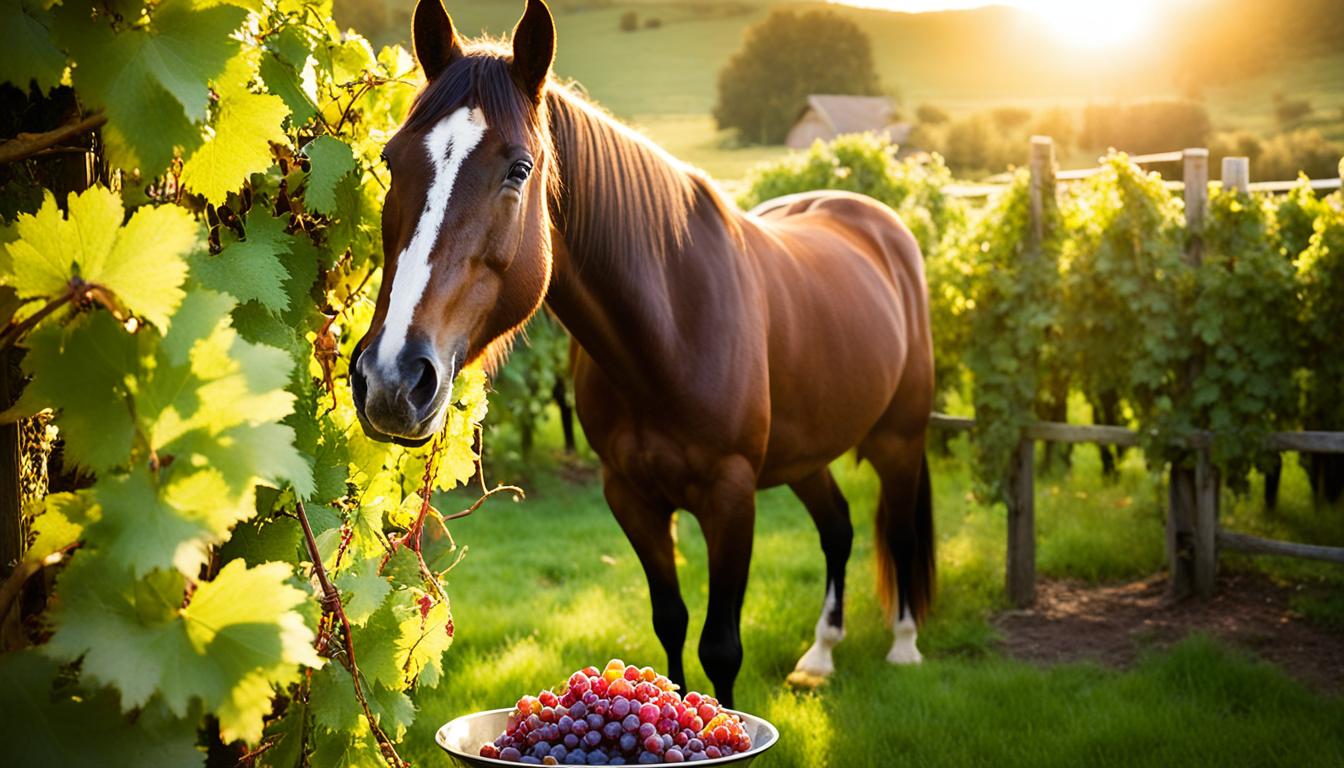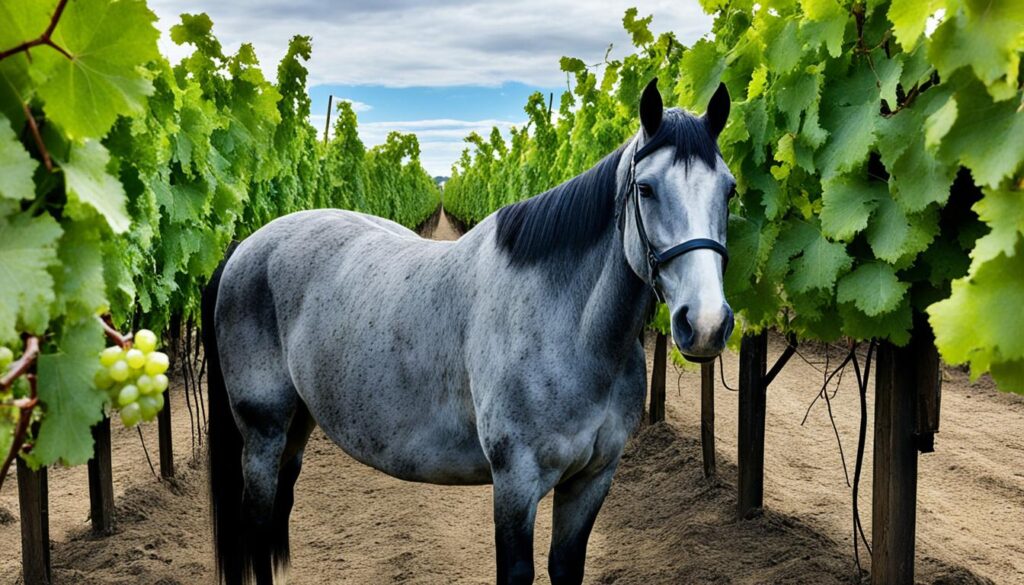Can Horses Eat Grapes? A Guide for Equine Owners

Horses are known for their diverse dietary needs, and many owners wonder if grapes can be a safe and beneficial addition to their equine companions’ diets. While horses primarily thrive on a diet of hay and grass, their natural curiosity often leads them to explore new food options. The question “Can horses eat grapes?” is a common one, and the answer requires a closer look at the nutritional benefits, potential risks, and proper ways to incorporate grapes into a horse’s feeding routine.
Key Takeaways
- Grapes can provide beneficial nutrients for horses, such as antioxidants, vitamins, and minerals.
- Proper serving sizes and feeding frequency are crucial to prevent potential health issues.
- Grapes should be washed thoroughly and sliced before feeding to minimize choking hazards.
- Toxic compounds in grape vines and leaves can be harmful to horses, so these parts should never be fed.
- Introducing grapes gradually and monitoring your horse’s reaction is essential for a safe and healthy experience.
Introduction to Feeding Grapes to Horses
Horses are naturally curious creatures, often displaying an interest in exploring new foods. While it’s tempting to indulge your equine friend’s desires, it’s crucial to understand which foods are safe and which should be avoided. When it comes to introducing grapes into a horse’s diet, it’s important to approach it with caution and care.
Horses’ Natural Curiosity for New Foods
Horses are hindgut fermenters, with the majority of their digestion taking place in the large intestine. Their diet should primarily consist of forage, such as hay or grass, complemented by concentrates like grains or pellets. Overfeeding or underfeeding horses can lead to health issues, such as colic or laminitis. This natural curiosity toward new foods, including grapes, can sometimes lead horse owners to offer treats that may not be entirely suitable for their equine companions.
Importance of Knowing Safe and Unsafe Foods
While horses may show interest in a wide variety of foods, it’s crucial to understand which items are safe and which can potentially harm them. Some fruits and vegetables, such as tomatoes, peppers, and avocado, can be toxic to horses and should be avoided. On the other hand, grapes are generally considered safe for horses in moderation, provided they are introduced gradually and certain precautions are taken.
“Overfeeding or underfeeding horses can lead to health issues, such as colic or laminitis.”
By understanding your horse’s natural curiosity and the importance of safe feeding practices, you can introduce new foods, like grapes, in a way that promotes your horse’s overall health and well-being.
The Nutritional Benefits of Grapes for Horses
Grapes are a delightful and nutritious treat for horses, providing a wealth of vitamins, minerals, and antioxidants that can support their overall health and well-being. By understanding the nutritional breakdown of grapes and the potential health benefits they offer, equine owners can make informed decisions about incorporating these juicy fruits into their horse’s diet.
Nutritional Breakdown of Grapes
Grapes are a rich source of essential nutrients for horses. In a 100-gram serving, grapes contain:
- Carbs: 18 grams
- Dietary fiber: 0.9 grams
- Fat: 0.16 grams
- Protein: 0.72 grams
- Sugar: 15.48 grams
Additionally, grapes provide horses with valuable vitamins and minerals, including:
- Vitamin A: 5 micrograms
- Vitamin C: 4 micrograms
- Vitamin K: 14.6 micrograms
Grapes are made up primarily of water, containing 82% water, which can help support a horse’s hydration levels.
Health Benefits of Grapes for Horses
The nutritional profile of grapes offers a range of potential health benefits for horses. Grapes are rich in antioxidants that can help support a healthy immune system and reduce the risk of various health issues. The fiber content in grapes can also contribute to a horse’s overall digestive health. Additionally, the natural sugars in grapes can provide a burst of energy, making them a popular treat for active horses.
Incorporating grapes into a horse’s diet can be a great way to diversify their nutritional intake and offer a tasty, healthy snack. As with any new food, it’s important to introduce grapes gradually and monitor your horse’s response to ensure they tolerate them well.

“Grapes are among the top fruits that horses enjoy due to their sweetness.”
can horses eat grapes? Incorporating Grapes into Your Horse’s Diet
As we’ve established, horses can safely enjoy grapes as an occasional treat. However, it’s crucial to introduce them gradually and monitor your horse’s reaction. The key is to provide grapes in moderation, as part of a balanced diet.
Safe Serving Sizes and Frequency
When feeding grapes to your horse, it’s recommended to stick to a small handful, around 8-10 grapes per serving. Grapes should not make up a significant portion of your horse’s daily caloric intake, as they are relatively high in natural sugars. Aim to offer grapes as an occasional treat, no more than a few times per week.
Gradual Introduction and Monitoring
When introducing grapes to your horse’s diet, take it slow. Start with just one or two grapes and observe your horse’s reaction. Some horses may be allergic to grapes, which can lead to adverse reactions. Monitor your horse closely for any signs of discomfort, such as digestive issues or skin irritation.
Preparation and Feeding Methods
Before feeding grapes to your horse, be sure to wash them thoroughly and slice them in half to prevent choking. You can either hand-feed the grapes or mix them into your horse’s regular feed. Avoid feeding grapes with seeds or stems, as these can pose a potential choking hazard.
Remember, grapes should always be given in moderation and as an occasional treat, not as a regular part of your horse’s diet. By following these guidelines, you can safely incorporate the safe amount of grapes for horses and preparing grapes for horses into your equine companion’s mealtime routine.
“Grapes are a convenient and nutritious treat for horses, but they should be introduced and fed with caution.” – Equine Nutritionist Madeline Boast
Potential Risks and Precautions
While grapes can be a delightful and nutritious treat for most horses, it’s crucial to be aware of the potential risks and precautions when incorporating this fruit into their diet. Certain horses may be more susceptible to the adverse effects of grapes, and it’s essential for equine owners to understand these considerations.
Horses That Shouldn’t Eat Grapes
Horses with insulin resistance should never be given grapes due to their high sugar content. According to recent studies, around 80% of horses with fat deposits in specific areas like the crest of the neck, rump, shoulders, or back may have insulin resistance, which requires a low-starch, low-sugar diet.
Additionally, horses with Cushing’s disease, a condition that affects the pituitary gland, also need a low-starch, low-sugar diet, indicating that a portion of the equine population may be sensitive to grapes. Just like chocolate, which is toxic to horses due to the presence of theobromine, grapes should be avoided for these horses.
Furthermore, many horses may be lactose intolerant, similar to humans, as they grow older. Feeding dairy products like ice cream, cheese, and yogurt can cause digestive issues, so it’s best to steer clear of these as well.
- Horses with insulin resistance should not eat grapes due to their high sugar content.
- Horses with Cushing’s disease require a low-starch, low-sugar diet, making grapes unsuitable.
- Older horses may be lactose intolerant, so dairy products like ice cream, cheese, and yogurt should be avoided.
It’s important to note that grapes are not the only food that can be potentially harmful to horses. Various toxic fruits, vegetables, and other plants, such as chocolate, tall fescue, buttercup, poison hemlock, nightshade species, black cherry, red maple, black walnut, and oak, can also pose risks to equines and should be closely monitored.

Equine owners should also be cautious when using commercial treats with added vitamins and minerals, as these can lead to over or under-nutrition in horses, potentially causing imbalances in their diets.
“Feeding grapes to horses with insulin resistance or Cushing’s disease can be extremely risky, as these horses require a carefully balanced diet to manage their conditions.”
Conclusion
In summary, grapes can be a safe and enjoyable treat for most horses when incorporated into their diet with appropriate precautions. By understanding the nutritional benefits, proper serving sizes, and potential risks, horse owners can confidently include grapes as an occasional snack to enhance their horse’s overall well-being.
The key takeaways on feeding grapes to horses are: introduce them gradually, monitor your horse’s reaction, and always prioritize their safety and health. With the right approach, grapes can be a delightful addition to your horse’s treat regimen, providing essential vitamins, hydration, and a positive reinforcement during training and bonding sessions.
Ultimately, a well-balanced and thoughtfully designed diet, complemented by occasional healthy treats like grapes, can contribute to the long-term health and happiness of your equine companion. By staying informed and vigilant, you can ensure your horse enjoys the benefits of grapes while avoiding any potential risks.







